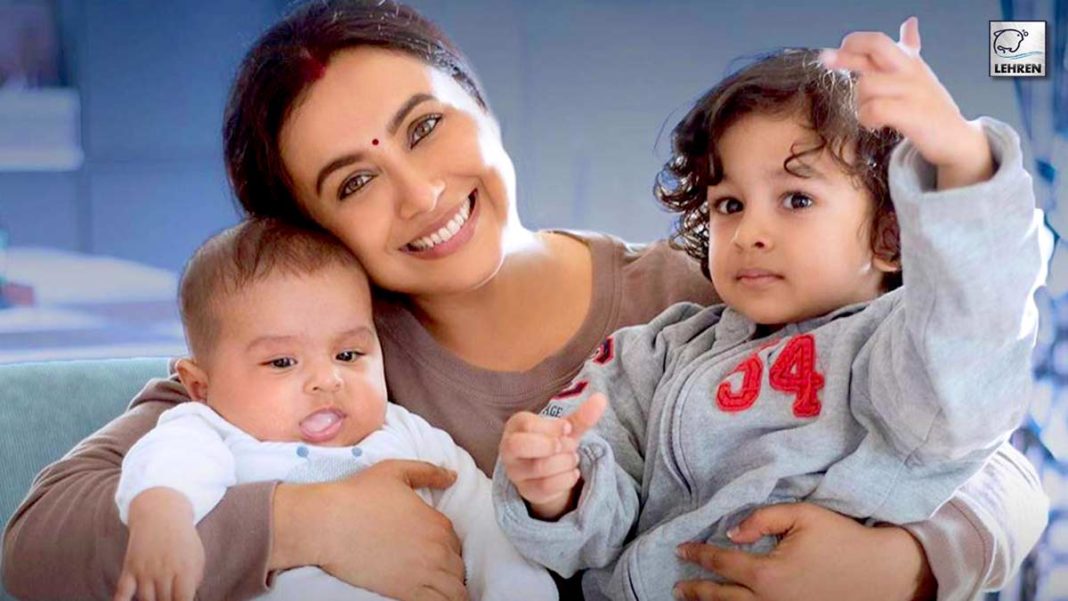The content is impeccable:
*A woman as the pivot. The flavour of the century, a woman’s story gets global backing whatever the format, especially when she’s a mother and it’s based on a true story. Mrs Debki Chatterjee (Rani Mukerji) will straightaway have takers listening to her fight for justice.
*The triumph of a woman. When Debki hits back at husband Anirudh (Anirban Bhattacharya), and slaps him real hard, immediately after he has just landed a thappad on her, the spontaneous applause from viewers rightly endorses this contemporary feminism.
*A solitary woman versus formidable opponents, the classic David & Goliath stand-off. Wicked social welfare workers in a heartless western country, Norway in this case, with a wicked legal system that can’t spot the cultural difference in the way a Bengali mother brings up her kids.
*A mother-in-law straight out of an Indian TV serial. Although feminism says this traditional profile is not to be pushed anymore, the victory of Mrs C is that much sweeter when it’s a classic saas-bahu family showdown. Husband Anirudh is the callous penny-pinching MCP, more interested in getting his citizenship than in getting his two small kids (one, an infant that’s barely three months old) out of the clutches of the state that has taken them from the “unfit mother”. Anirudh’s ma is evil from the first introduction, his father is an impotent bystander, his good-for-nothing brother will wrest Mrs C’s kids from her solely for the money dangled by the Norwegian lawyers. It’s Debki Chatterjee vs Outlaws.
*A spirited, heart-wrenching performance by Rani.
The content therefore has it all.
But content is different from narration and that’s where director Ashima Chibber along with co-writers Rahul Handa and Sameer Satija needed to get a grip on their tear-jerker.
One isn’t sure how faithfully the screenplay has depicted the real-life story of Sagarika Chakraborty in her fight against the foster care system of Norway, her husband and in-laws. But the many references to the ‘social workers’ being aghast because Debki feeds her kids with her hand and doesn’t use cutlery, too many scenes about breast feeding and pumping breast milk for the infant, her many bouts of hysteria in public and in court, don’t exactly make an endearing story.
Telling a good story cinematically is not about having sad songs like ‘Shubo shubo’ and ‘Maa ke dil’ with flashbacks to Debki and Anirudh as a young couple moving into their new house in Norway, having one kid after the other, and happy scenes playing with her kids. This old-fashioned use of songs and flashbacks don’t add value to the storytelling.
Since it’s mentioned that the ‘social workers’ have been visiting them for weeks to appraise their child-rearing abilities and it’s not like they’ve suddenly turned up on their doorstep to “kidnap” the Chatterjee children, it’s baffling why Anirudh and Debki don’t have conversations between themselves on keeping the house tidy or how to take care of their son’s school project or how to conduct themselves instead of getting exasperated and helpless in front of the ‘welfare officers’.
Jerky references to an Indian couple that has tattled on them or Debki meeting a friend and a lawyer named Rabia quite out of the blue, don’t make a smooth, seamless narration.
The usually competent Jim Sarbh as a lawyer representing the government of Norway, has a character sketch as confusing as his name Daniel Singh Ciupek.
Moving from hearing to hearing, losing in court after court, getting gypped by the husband into giving up the kids and going back to India where she’ll get them, fighting in a Kolkata court… It’s endlessly heavy all the way, with torrents of tears.
One isn’t asking for entertainment in a story like this but surely it could’ve been told in a more engrossing way without cardboard cliches as characters?
Finally, the reason why ‘social worker’ and ‘welfare officers’ are within single quotes is because the screenplay makes severe allegations against these officers, their organisation and the government, for taking kids away from their families for cash incentives and much worse. Taking them away from Mrs C but handing them over to her useless brother-in-law is one of the major question marks against the authorities and their legal system. If any of this is true, Norway needs to look harder at its social services. India and the world too, should be focusing on this industrial scale social crime and not stop at only telling the story of Mrs C.
Watch the trailer of Mrs Chatterjee Vs Norway:
Check Out: Review | Rana Naidu – Crime, Family & Politically Inappropriate

